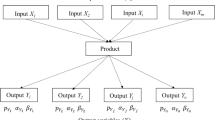Abstract
We present a model-based approach to performance evaluation of a collection of similar systems based on runtime observations. As a concrete example, we consider an assembly line made of sequential workstations with transfer blocking and no buffering capacity, implementing complex workflows with random choices and sequential/cyclic phases with generally distributed durations and no internal parallelism. Starting from the steady state, an inspection mechanism is subject to some degree of uncertainty in the identification of the current phase of each workstation, and is in any case unable to estimate remaining times. By relying on the positive correlation between delays at different workstations, we provide stochastic upper and lower approximations of the performance measures of interest, including the time to completion of the local workflow of each workstation and the time until when a workstation starts a new job. Experimental results show that the approximated evaluation is accurate and feasible for lines of significant complexity.
Access this chapter
Tax calculation will be finalised at checkout
Purchases are for personal use only
Similar content being viewed by others
References
Akyildiz, I.F.: On the exact and approximate throughput analysis of closed queuing networks with blocking. IEEE Trans. Softw. Eng. 14(1), 62–70 (1988)
Angius, A., Horváth, A., Colledani, M.: Moments of accumulated reward and completion time in markovian models with application to unreliable manufacturing systems. Perform. Eval. 75, 69–88 (2014)
Balsamo, S., Personè, V.D.N., Inverardi, P.: A review on queueing network models with finite capacity queues for software architectures performance prediction. Perform. Eval. 51(2), 269–288 (2003)
Biagi, M., Carnevali, L., Paolieri, M., Patara, F., Vicario, E.: A stochastic model-based approach to online event prediction and response scheduling. In: Fiems, D., Paolieri, M., Platis, A.N. (eds.) EPEW 2016. LNCS, vol. 9951, pp. 32–47. Springer, Cham (2016). doi:10.1007/978-3-319-46433-6_3
Blair, G., Bencomo, N., France, R.B.: Models@run.time. Computer 42, 10 (2009)
Bruneo, D., Distefano, S., Longo, F., Puliafito, A., Scarpa, M.: Evaluating wireless sensor node longevity through Markovian techniques. Comput. Netw. 56(2), 521–532 (2012)
Bucci, G., Carnevali, L., Ridi, L., Vicario, E.: Oris: a tool for modeling, verification and evaluation of real-time systems. Int. J. Softw. Tools Technol. Transf. 12(5), 391–403 (2010)
Carnevali, L., Nugent, C., Patara, F., Vicario, E.: A continuous-time model-based approach to activity recognition for ambient assisted living. In: Campos, J., Haverkort, B.R. (eds.) QEST 2015. LNCS, vol. 9259, pp. 38–53. Springer, Cham (2015). doi:10.1007/978-3-319-22264-6_3
Cheng, B.H.C., et al.: Using models at runtime to address assurance for self-adaptive systems. In: Bencomo, N., France, R., Cheng, B.H.C., Aßmann, U. (eds.) Models@run.time. LNCS, vol. 8378, pp. 101–136. Springer, Cham (2014). doi:10.1007/978-3-319-08915-7_4
Colledani, M., Horvath, A., Angius, A.: Production quality performance in manufacturing systems processing deteriorating products. CIRP Ann. Manuf. Technol. 64(1), 431–434 (2015)
Gorecky, D., Schmitt, M., Loskyll, M., Zühlke, D.: Human-machine-interaction in the industry 4.0 era. In: IEEE International Conference on Industrial Informatics (INDIN), pp. 289–294. IEEE (2014)
Harel, D., Naamad, A.: The statemate semantics of statecharts. ACM Trans. Softw. Eng. Methodol. (TOSEM) 5(4), 293–333 (1996)
Homm, D., German, R.: Analysis of hierarchical semi-markov processes with parallel regions. In: Remke, A., Haverkort, B.R. (eds.) MMB&DFT 2016. LNCS, vol. 9629. Springer, Cham (2016)
Horváth, A., Paolieri, M., Ridi, L., Vicario, E.: Transient analysis of non-Markovian models using stochastic state classes. Perform. Eval. 69(7–8), 315–335 (2012)
Horváth, A., Telek, M.: PhFit: a general phase-type fitting tool. In: Field, T., Harrison, P.G., Bradley, J., Harder, U. (eds.) TOOLS 2002. LNCS, vol. 2324, pp. 82–91. Springer, Heidelberg (2002). doi:10.1007/3-540-46029-2_5
Kulkarni, V.: Introduction to Modeling and Analysis of Stochastic Systems. Springer Texts in Statistics. Springer, Heidelberg (2011). doi:10.1007/978-1-4419-1772-0
Kulkarni, V.G.: Modeling and Analysis of Stochastic Systems. CRC Press, Boca Raton (2016)
Muppala, J.K., Woolet, S.P., Trivedi, K.S.: Real-time systems performance in the presence of failures. Computer 24(5), 37–47 (1991)
Murata, T.: Petri nets: properties, analysis and applications. Proc. IEEE 77(4), 541–580 (1989)
Perros, H.G., Altiok, T.: Approximate analysis of open networks of queues with blocking: tandem configurations. IEEE Trans. Softw. Eng. 3, 450–461 (1986)
Reinecke, P., Krauß, T., Wolter, K.: Hyperstar: phase-type fitting made easy. In: International Conference on Quantitative Evaluation of Systems (QEST), pp. 201–202. IEEE (2012)
Salfner, F., Lenk, M., Malek, M.: A survey of online failure prediction methods. ACM Comput. Surv. (CSUR) 42(3), 10 (2010)
Sanders, W.H., Meyer, I.F.: A unified approach for specifying measures of performance, dependability and performability. In: Avižienis, A., Laprie, J.C. (eds.) Dependable Computing for Critical Application. Dependable Computing and Fault-Tolerant Systems, vol. 4. Springer, Vienna (1991)
Serfozo, R.: Basics of Applied Stochastic Processes. Probability and Its Applications. Springer, Heidelberg (2009)
Stoyan, D., Daley, D.J.: Comparison Methods for Queues and Other Stochastic Models. Wiley, New York (1983)
Van der Aalst, W.M.: The application of petri nets to workflow management. J. Circ. Syst. Comput. 8(01), 21–66 (1998)
Vicario, E., Sassoli, L., Carnevali, L.: Using stochastic state classes in quantitative evaluation of dense-time reactive systems. IEEE Trans. Softw. Eng. 35(5), 703–719 (2009)
Author information
Authors and Affiliations
Corresponding author
Editor information
Editors and Affiliations
Rights and permissions
Copyright information
© 2017 Springer International Publishing AG
About this paper
Cite this paper
Biagi, M., Carnevali, L., Papini, T., Tadano, K., Vicario, E. (2017). An Inspection-Based Compositional Approach to the Quantitative Evaluation of Assembly Lines. In: Reinecke, P., Di Marco, A. (eds) Computer Performance Engineering. EPEW 2017. Lecture Notes in Computer Science(), vol 10497. Springer, Cham. https://doi.org/10.1007/978-3-319-66583-2_10
Download citation
DOI: https://doi.org/10.1007/978-3-319-66583-2_10
Published:
Publisher Name: Springer, Cham
Print ISBN: 978-3-319-66582-5
Online ISBN: 978-3-319-66583-2
eBook Packages: Computer ScienceComputer Science (R0)




